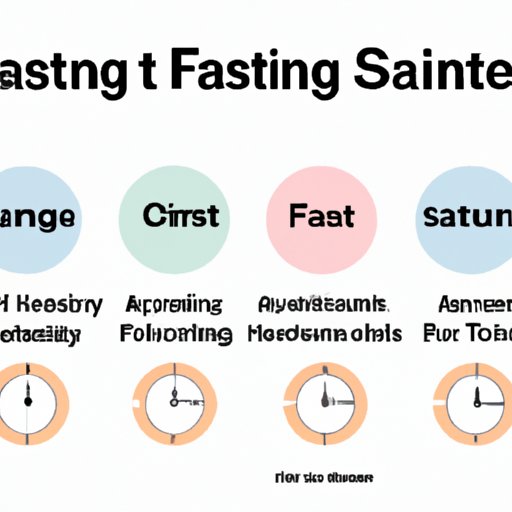
I. Introduction
As fasting gains popularity in recent years, many people are wondering how long they can fast safely and effectively. Whether you’re interested in fasting for weight loss, spiritual reasons, or just to challenge yourself, it’s important to understand the science behind it and what happens to your body during a fast. In this article, we’ll explore the different stages of fasting, the benefits and risks of intermittent fasting, and how to break a fast properly.
II. The Science Behind Fasting: How Long Can You Go Without Food?
The human body’s primary source of energy is glucose, which comes from the food we eat. During a fast, the body starts to use stored glucose in the form of glycogen. Once the glycogen runs out, the body starts breaking down fats into ketones for energy. Under normal circumstances, a healthy person can go without food for about three to five days before the body starts breaking down muscle tissue for energy.
However, the duration of fasting can vary depending on individual factors such as age, health status, and environment. Pregnant women, children, and people with certain medical conditions should not fast without medical supervision.
III. The Different Stages of Fasting: What Happens to Your Body When You Fast?
Fasting can be broken down into three stages: the fed state, the post-absorptive state, and the fasting state. During the fed state, the body is digesting and absorbing food. In the post-absorptive state, the body is not processing food but is still using stored glucose for energy. In the fasting state, the body starts using stored fat for energy and enters a state of ketosis.
During extended fasting, the body goes through a process called autophagy, which is the body’s natural process of cleaning out damaged cells and creating new ones. While autophagy has potential health benefits, extended fasting also comes with risks such as muscle loss, dehydration, and fatigue. To manage the symptoms of fasting, it’s important to drink plenty of fluids, get enough rest, and take electrolytes.
IV. The Benefits of Intermittent Fasting: How Short but Consistent Fast can Improve Your Health?
Intermittent fasting, which involves alternating periods of fasting and eating, has gained popularity in recent years for its potential health benefits. Studies have shown that intermittent fasting can improve metabolism, promote weight loss, and reduce inflammation.
There are different types of intermittent fasting, including time-restricted eating, where you fast for a certain period each day, and alternate-day fasting, where you fast for a full day and eat normally the next. Each type has its benefits and risks, and it’s important to consider individual needs and preferences when choosing a fasting regimen.
V. Breaking the Fast: Best Ways to Break Your Fast Safely and Effectively
Breaking a fast properly is essential to avoid digestive discomfort and other symptoms such as nausea and diarrhea. It’s important to start with small, easily digestible meals and gradually reintroduce food to your system. Some people prefer to break their fast with a high-protein meal, while others choose to start with fruit or vegetable juices.
It’s also important to listen to your body and stop eating if you feel full or uncomfortable. Eating slowly and mindfully can help you recognize your body’s signals and avoid overeating after a fast.
VI. Fasting and Weight Loss: Can Skipping Meals Help You Lose Weight?
While fasting can lead to weight loss, it’s not a sustainable or healthy solution for everyone. The most effective way to lose weight is through a healthy diet and exercise. Skipping meals can also lead to overeating later in the day, which can contribute to weight gain.
If you’re considering fasting for weight loss, it’s important to consult a healthcare provider first and be aware of the potential risks such as nutrient deficiencies, dehydration, and muscle loss.
VII. When to Avoid Fasting: Warning Signs That Your Body Needs Food
Fasting can be dangerous if not done correctly and under proper circumstances. It’s important to stop fasting if you experience symptoms such as fatigue, dizziness, or weakness. Pregnant women, children, and people with certain medical conditions should not fast without medical supervision.
It’s also important to avoid fasting if you have a history of disordered eating or have a negative relationship with food. Fasting should never be used as a punishment or a way to justify binge eating.
VIII. Conclusion
Fasting can have potential health benefits, but it’s important to approach it with mindfulness and awareness of your own health and needs. Whether you’re fasting for weight loss or spiritual reasons, it’s important to listen to your body and stop fasting if you experience any negative symptoms. By understanding the science behind fasting and how to break a fast safely, you can use fasting as a tool to improve your health and well-being.





